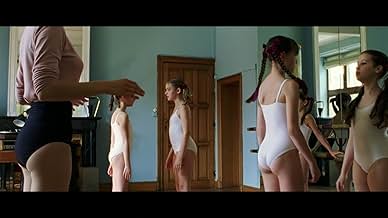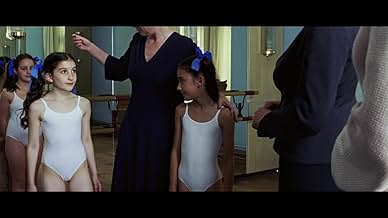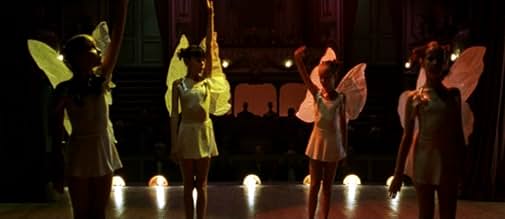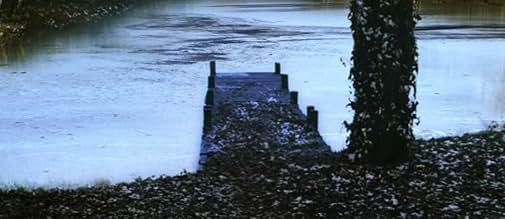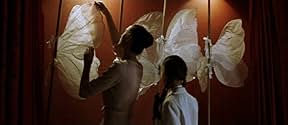IMDb-BEWERTUNG
6,8/10
6735
IHRE BEWERTUNG
Ein Blick in ein abgelegenes Internat für junge Mädchen.Ein Blick in ein abgelegenes Internat für junge Mädchen.Ein Blick in ein abgelegenes Internat für junge Mädchen.
- Regie
- Drehbuch
- Hauptbesetzung
- Auszeichnungen
- 8 Gewinne & 2 Nominierungen insgesamt
Empfohlene Bewertungen
We watched this film during my Film History and Theory class this past Thursday and aside from shoddy presentation (the projector was absolutely horrible and displayed the film too dark), I have to say that I enjoyed this quite a bit. At first, I almost dismissed it as artsy, pretentious French cinema due to the very slow pace and methodical direction but it had this eerie quality to it that kept my eyes glued to the screen, anticipating what was yet to come. The story is told in a very abstract way and the story is never really laid out for you in a conventional manner. In truth, it is a very simple tale but told in an imaginative way. There was great imagery and the use of sound to create a mysterious environment was very well done. At times it reminded me of the films of David Lynch, (especially Lost Highway and Mulholland Dr.) and Gaspar Noe (Irreversible), which is probably why I enjoyed it so much. The acting by the principals is very good, considering that they consisted mainly of very young girls. The director managed to capture natural performances from all of them and having worked with children on films in the past, I have to applaud her efforts on this end as I know how difficult it can be to get them to give you the results you're looking for. From a negative stance, the film runs just a bit too long and the pacing could've been trimmed a little to make it run a bit faster and leaner. There were stretches where the film felt like it was never going to end. In the end, I would definitely recommend this to those who appreciate art-house cinema as this caters directly to them. This was an impressive debut for Ms. Hadzihalilovic and I am definitely curious to see what she comes up with next.
RATING: ***1/2 out of *****.
RATING: ***1/2 out of *****.
There can't be many films that occupy your mind for many days afterwards, make you read the book they are based on, and then watch them again.
"Innocence" is one of those films and it is both beautiful and intriguing at the same time. It is based on a book by Frank Wedekind called "Mine-Haha or the corporeal education of girls", the only published fragment of his unfinished novel "Hildalla". It was first published in 1901 and although beautifully written it has much darker undertones than the film with references to a body cult of youth and natural beauty which would later become exploited by Nazi culture.
The film is very much a metaphor for a childhood world which is in many ways separate but also protected from that of adults. It plays in an isolated Girls School their children enter at the time when they start to make their own independent experiences of the world around them and ends with the onset of puberty and attainment of menarche, both symbolising the emotional and physical end of childhood. The cinematography is beautiful and reminded me in many ways of Tarkovsky with its symbolism and haunting images. However, the story can seem a little simplistic and linear times and often appears to demand more depth from the young child actors than they could possibly deliver.
Nevertheless this is a very interesting and thought-provoking film and well worth watching. The French dialogue often has a musical quality and as long as you're prepared to watch this in a calm and unhurried state of mind this is very rewarding and unusual cinematic experience.
"Innocence" is one of those films and it is both beautiful and intriguing at the same time. It is based on a book by Frank Wedekind called "Mine-Haha or the corporeal education of girls", the only published fragment of his unfinished novel "Hildalla". It was first published in 1901 and although beautifully written it has much darker undertones than the film with references to a body cult of youth and natural beauty which would later become exploited by Nazi culture.
The film is very much a metaphor for a childhood world which is in many ways separate but also protected from that of adults. It plays in an isolated Girls School their children enter at the time when they start to make their own independent experiences of the world around them and ends with the onset of puberty and attainment of menarche, both symbolising the emotional and physical end of childhood. The cinematography is beautiful and reminded me in many ways of Tarkovsky with its symbolism and haunting images. However, the story can seem a little simplistic and linear times and often appears to demand more depth from the young child actors than they could possibly deliver.
Nevertheless this is a very interesting and thought-provoking film and well worth watching. The French dialogue often has a musical quality and as long as you're prepared to watch this in a calm and unhurried state of mind this is very rewarding and unusual cinematic experience.
10o_cubitt
Innocence is an extraordinary film that explores its theme with such determined rigor one cannot help but be compelled and shocked by every moment. Innocence explores the period in girls' lives before they lose their Innocence and start adulthood. The mysterious school to which we are introduced through Tarkovskyesque images of flowing water becomes a dark and at times haunting manifestation of both the young girls' enforced Innocence as well as the setting for the film's mystery narrative in which we find ourselves desperate to see through the schools wooded grounds to some kind of epiphany.
Part of the success of Innocence is that it is able to confuse the viewer and forces the audience to confront their own ideas of Innocence and how we as adults should view images of Innocence. Images of the young girls at play should be easier to watch but this is an adult film with a predominately adult audience and the darkness of the films own geography plays with ones ideas of Innocence and the loss of it.
Extraordinary images, extraordinary performances, a great film.
Part of the success of Innocence is that it is able to confuse the viewer and forces the audience to confront their own ideas of Innocence and how we as adults should view images of Innocence. Images of the young girls at play should be easier to watch but this is an adult film with a predominately adult audience and the darkness of the films own geography plays with ones ideas of Innocence and the loss of it.
Extraordinary images, extraordinary performances, a great film.
Innocence is a unique film that defies typical description and ignores filmmaking conventions. If you like films that confuse and surprise, you just might love this. If you need something loud, viscerally exhilarating or explicit, look elsewhere. Innocence is a film that plays with our preconceived notions about underage female sexuality. If you enjoy Suspiria of (the real) Alice in Wonderland this little-seen French gem comes highly recommended. However, this film does not glorify in cute girls dancing or wandering through fantastical dreamworlds. Yes, it is dreamlike and mystifying, but this is not Dario Argento.
Innocence approaches Picnic at Hanging Rock's dreamlike quality. What it manages to achieve is presenting what is both natural but unfamiliar through the eyes the young girls experiencing it. Innocence film is very dreamlike and doesn't rest on one main character's perspective.
Innocence is both haunting and sweet. This is a film about the loss of innocence in young girls, but it toys with our notions of innocence, sexuality and objectification. In short, what does being a woman today mean? You won't be satisfied though one viewing of this film. If watching something once only makes you want to see it again, it must be worth it.
Seek this out. Pass over the latest trending rental and add this to your Netflix queue.
Innocence approaches Picnic at Hanging Rock's dreamlike quality. What it manages to achieve is presenting what is both natural but unfamiliar through the eyes the young girls experiencing it. Innocence film is very dreamlike and doesn't rest on one main character's perspective.
Innocence is both haunting and sweet. This is a film about the loss of innocence in young girls, but it toys with our notions of innocence, sexuality and objectification. In short, what does being a woman today mean? You won't be satisfied though one viewing of this film. If watching something once only makes you want to see it again, it must be worth it.
Seek this out. Pass over the latest trending rental and add this to your Netflix queue.
The final title, "for Gaspar" (Noe, director of IRREVERSIBLE), hints at the pedigree of the makers of this quite fascinating study of young girls on the cusp of adolescence.
Benoit Debie, the cinematographer of IRREVERSIBLE, shot the film.
Six year old Iris (Zoe Auclair) arrives at her new country school in a coffin. She becomes infatuated with twelve-year-old Bianca (Berangare Haubruge) who disappears each evening and returns in the morning. The girls spend most of their days studying ballet and preparing for an important exam.
The school is like a keep. The girls are encouraged to find happiness in obedience. Parents never visit. The world beyond its tall hedges exists like something within a dream.
Director Lucile Hadzihalilovic imbues every aspect of the film with a dreamy, meditative veneer. Shots of the pre-teen nymphs dancing, cartwheeling and splashing about in shallow water recall the grainy erotic imagery of David Hamilton's early feature films -- in particular, LAURA and BILITIS. The ballet sequences and striking compositions of solitary female figures in towering external landscapes owe a small debt to Dario Argento's SUSPIRIA and, to a lesser extent, his PHENOMENA. But this is not a deliberate softcore meditation on childhood sexuality. It is a metaphorical examination of how innocence is ruptured by its own curiosity.
The camera angles stress the importance and prominence of legs to a fetishistic degree. This focus is an organic extension of the girls' ballet training; a darker purpose for legs is indicated later in a chilling line of dialogue. Debie's cinematography emphasizes light and shade and is never pretty for its own sake.
The forest filled with lamps has a deliciously surreal, fairytale quality. The sequences where the girls dance for a faceless audience reminded me of one of MULHOLLAND DRIVE's most haunting sequences. The film's sound design also echoes the internal voids of the Lynchian world.
The film is not big on explanations and is a touch too slow at times, but it presents a thoroughly realized universe that is a stark metaphor for life's discoveries and disappointments. The performances possess perfect pitch and the tone remains both haunting and consistent.
What exactly is the film about? The girls may be in a purgatory of sorts, a resting place between life and death. Perhaps not. Perhaps they are in a holding pattern between childhood (innocence) and adulthood (a state requiring some loss of innocence), and when they manage to escape (succumbing to their pre-adolescent curiosity), they have forfeited their place in childhood forever. But only perhaps.
Benoit Debie, the cinematographer of IRREVERSIBLE, shot the film.
Six year old Iris (Zoe Auclair) arrives at her new country school in a coffin. She becomes infatuated with twelve-year-old Bianca (Berangare Haubruge) who disappears each evening and returns in the morning. The girls spend most of their days studying ballet and preparing for an important exam.
The school is like a keep. The girls are encouraged to find happiness in obedience. Parents never visit. The world beyond its tall hedges exists like something within a dream.
Director Lucile Hadzihalilovic imbues every aspect of the film with a dreamy, meditative veneer. Shots of the pre-teen nymphs dancing, cartwheeling and splashing about in shallow water recall the grainy erotic imagery of David Hamilton's early feature films -- in particular, LAURA and BILITIS. The ballet sequences and striking compositions of solitary female figures in towering external landscapes owe a small debt to Dario Argento's SUSPIRIA and, to a lesser extent, his PHENOMENA. But this is not a deliberate softcore meditation on childhood sexuality. It is a metaphorical examination of how innocence is ruptured by its own curiosity.
The camera angles stress the importance and prominence of legs to a fetishistic degree. This focus is an organic extension of the girls' ballet training; a darker purpose for legs is indicated later in a chilling line of dialogue. Debie's cinematography emphasizes light and shade and is never pretty for its own sake.
The forest filled with lamps has a deliciously surreal, fairytale quality. The sequences where the girls dance for a faceless audience reminded me of one of MULHOLLAND DRIVE's most haunting sequences. The film's sound design also echoes the internal voids of the Lynchian world.
The film is not big on explanations and is a touch too slow at times, but it presents a thoroughly realized universe that is a stark metaphor for life's discoveries and disappointments. The performances possess perfect pitch and the tone remains both haunting and consistent.
What exactly is the film about? The girls may be in a purgatory of sorts, a resting place between life and death. Perhaps not. Perhaps they are in a holding pattern between childhood (innocence) and adulthood (a state requiring some loss of innocence), and when they manage to escape (succumbing to their pre-adolescent curiosity), they have forfeited their place in childhood forever. But only perhaps.
Wusstest du schon
- WissenswertesIn the 'extras' on the DVD release, the director relates that children playing unsupervised in nature (the forest, the pond) is a 'freeing' setting for them, an 'uncontrolled' environment to explore. Water is very important, as it is a highly visible medium in its many forms (including within or from underneath a surface), and it is necessary, sensual, and enjoyable, but also dangerous (the drowning), and evokes many emotions. Flowing water can also symbolize the passage of time. The dynamic of children relating to adults, not understating them or their actions, while seeing them as role models, is another dichotomy the director wanted to emphasize. Ambiguity and a 'dream-like' quality are also important elements of the film. She states they digitally enhanced or 'tweaked' colors in the film to 'non-realistic' tones, to achieve mood and lighting effect, particularly day for night shots. The director says she is not interested in explaining meaning: "... what I like in cinema is being lost. I like films I don't completely understand, so they stay with me longer after they're over," and, "I believe everyone can find their own stories within the film."
- PatzerWhen Bianca says goodbye to all the girls there is snow in the alley and they are all outside dressed with bare arms and bare legs. Then Bianca runs away in pouring rain. No more snow on the ground.
- Crazy CreditsThe entire set of credits is shown at the opening of the movie.
- VerbindungenFeatured in Women Make Film: A New Road Movie Through Cinema (2018)
- SoundtracksOrchestral Suite from La Petite Renard Rusée
Composed by Leos Janácek
Libretto by Rudolf Tesnohlídek
Performed by Czech Philharmonic (as The Czech Philharmonic)
Conducted by Vaclav Talich
Top-Auswahl
Melde dich zum Bewerten an und greife auf die Watchlist für personalisierte Empfehlungen zu.
- How long is Innocence?Powered by Alexa
Details
- Erscheinungsdatum
- Herkunftsländer
- Sprache
- Auch bekannt als
- Невинність
- Drehorte
- Parc du Cinquantenaire, Brüssel, Belgien(walking to new school)
- Produktionsfirmen
- Weitere beteiligte Unternehmen bei IMDbPro anzeigen
- Laufzeit2 Stunden 2 Minuten
- Farbe
- Sound-Mix
- Seitenverhältnis
- 2.35 : 1
Zu dieser Seite beitragen
Bearbeitung vorschlagen oder fehlenden Inhalt hinzufügen



